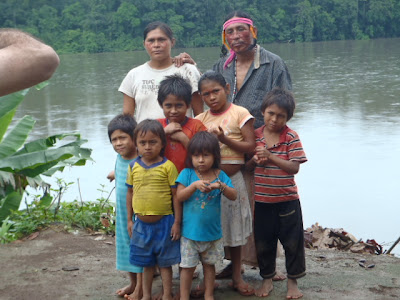Newsletter from the
Rainforest No 9
(This is the text of my last blog post on the VSO site)
(This is the text of my last blog post on the VSO site)
Last try
“VSO International decided to take this site off-line,” came the polite message from an obscure Dutch website that claimed to be linked to the Netherlands arm of Voluntary Service Overseas. I could not easily decide what was going on, because the whole site was in Dutch (therefore, sounded like double Dutch to me*) and was full of advertisements, so it more or less looked like an unpalatable example of outsourcing.
Anyway, I said to myself, I should count myself lucky that the site for my blog that was initially set up for the Ethiopia Experience lasted as long as it lasted, and kindly let me post my messages from Ecuador about a placement that was voluntary, alright, but not exactly linked to VSO. Frankly speaking, not at all.
Although it seemed that the posts were read by thousands, the completely unrelated and annoying reactions in Chinese and Russian made me realize long ago that it was not only my extended circle of friends who visited the site, but there must have been automatic message postings as well.
 | |
| Last day at the Lodge |
 | |
| Sunset |
I keep in touch with mostly everyone and was looking at the image of the Lodge posted by one of the boat drivers (reflecting a time when the lagoon was larger) with a longing sigh this morning.
 | |
| The Lodge from the air |
I remember one of the last teacher training sessions when, as a language task,
my colleagues had to introduce themselves in a teacher training workshop giving
their Spanish and Achuar first names. Not everyone had an Achuar name so the
question “Do you have an Achuar name?” necessarily came up. When it was my turn
to reply, I said “You know what? Give me an Achuar name.” I could hear names
suggested and discarded and then Luis said: “We decided on your Achuar name. You will be called Suwa.”
 | |
| Suwa |
It was Lucy Wendell Thorpe’s “Into the Rain Forest: Living the Achuar Way at Suwa” that originally gave me an insight into what I was letting myself in for. When I arrived I found a copy of the book, duly signed by the author, on a bookshelf in the bar and having read passages on the Internet, I now sat down and devoured the whole book from cover to cover. The language was to the point, I learnt words like “raised boardwalk” and “outboard engine” and a lot more; all linked to the everyday experience I was having. These vocabulary items were real gems, because the staff at the Lodge needed them to describe the physical environment.
 | ||
| A rain forest tree in bloom |
During my first return to Cuenca I had the book photocopied and then put the original back on the shelf; I could often see tourists leafing through it. By then I was hooked: I discovered some of my present day students in the photos and the face of the founder’s wife got etched in my mind. So much so that when, on one occasion, Veneranda was walking down the “raised boardwalk” to the boat landing just as I came back from the high school, I thought I was seeing a ghost. But it was Veneranda alright, only looking a couple of years older and now a widow. It was one of those situations when you know a lot more about someone than they know about you, which is practically nothing.
 | |
| Veneranda's son and his family |
I started teaching passages from the book to some of my more advanced students and I often gazed at Lucy Wendell-Thorpe’s photo, too, trying to figure out what brought this rather plain looking, large-boned, bespectacled woman to the jungle. So you can imagine how excited I got when I was asked to act as an interpreter for a group of tourists who were visiting Suwa. We were received by one of Veneranda’s sons whom I knew well from the photos in the book, while Veneranda and her grandchildren were watching us from a safe distance.
 | |
| Veneranda offering chicha |
Before we left, the women brought out the handcrafted items for sale. I made sure I bought a ceramic bowl from Veneranda’s lot, and a necklace from my student, Ximena’s family. I could feel Veneranda’s gaze on me. I went up to her and said, “I read so much about you in Lucy’s book. Do you remember her?” “Of course, I do. And you know what? All along you were doing the translating for the tourists, I was telling my son: look at the striking resemblance - she looks exactly like Lucy.”
Good night or, rather, farewell.
*Double Dutch: unintelligible gibberish, meaningless talk or writing









